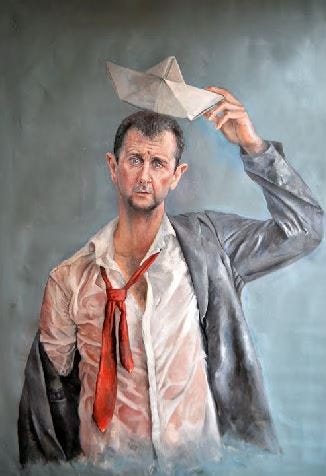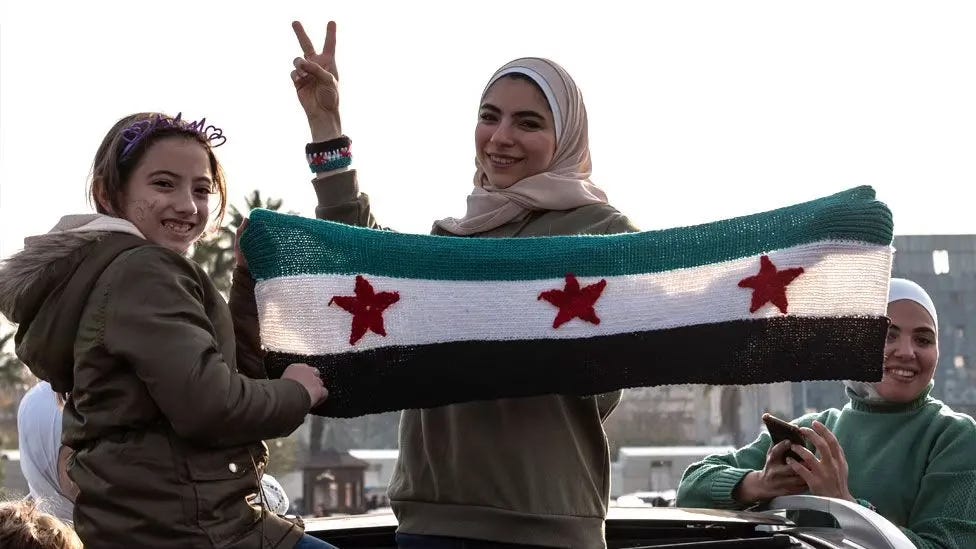It’s the Syrian people, stupid!
The fall of Assad cannot be understood solely through the lens of geopolitics or realpolitik. It’s a testament to the perseverance and agency of the Syrian people.
The problem with too much geopolitics is that it often stops saying anything meaningful. It fails to capture life on the streets, the networks of people, the emotions that, at the end of the day, truly matter. The same critique applies to realpolitik frameworks. I’m not arguing they’re useless—far from it. They can be valuable analytical tools. But there’s a limit to viewing the world as a Eurocentric board game.
Yes, Syria has been a battleground for global and regional powers, each pouring money and weapons into shaping the country’s future to suit their interests. Yes, the results have been uneven—some players have seen their investments evaporate, while others have emerged with tangible gains. Yes, the conflict will have regional repercussions.
And yes, Syria’s future is bleak; the question of who will govern and in what form remains tangled.
But the most critical point to grasp is this:
A family’s stranglehold crushed a nation. A tyrannical father and son siphoned off the people’s welfare and hope to fill the coffers of a small, sectarian circle of loyalists at the expense of millions.
The Assad regime, long thought to be eternal—its supporters chanting the slogan “qāʾidnā li-l-abad, al-Assad” (“Our leader forever, Assad”)—has finally fallen.
But speculations abound: Was this the result of a Turkish operation? A NATO plot? Did Israel and the U.S. orchestrate it? Was Russia the real loser? Or is it part of some grander scheme to dismantle Iran’s regime?
These questions, while teetering on the edge of conspiracy, may warrant discussion—if, and only if, they help us understand the atrocities endured by the Syrian people and identify those accountable beyond the Assad regime.
But for now…
Can we pause to acknowledge the joy and relief of Syrians worldwide? The old regime is gone. Whatever comes next, it is new.
In 2011, peaceful protests against Assad’s oppression erupted in Deraa. By 2024, Assad fled to Moscow, leaving behind a grim legacy. Syrians demanded freedom but were met with imprisonment, torture, displacement, and death.
The numbers tell a horrifying story: 613,500 dead.
55,000 tortured to death in Assad’s prisons.
25,000 perished at sea, entire families lost while trying to cross the Mediterranean.
The regime responsible for these horrors fell because the Syrian people demanded it. Any analysis—whether from the left or the right—that overlooks their agency disrespects the lives lost in the struggle.
Revolutions unfold in different ways. Some explode like supernovas, their moment of boundless possibility, their liminality fleeting. Others simmer, grinding their way through history, their transformations gradual and painstaking. In either case, the aftermath is fraught with uncertainty, and transitions are rarely seamless.
So, let’s get the order of things right:
Honour the Syrian people for their perseverance and resilience.
Next, recognize their agency.
Then, and only then, extrapolate the next steps and the actors who will shape them.
‘For now, there really are no words’
I’d like to share an excerpt from my colleague Kareem Shaheen’s remarkable piece, which captures the sentiments of countless Syrians:
‘For now there really are no words. My wife is from Aleppo, and the past couple of days have felt like a dam built of emotional wards and walls has crashed in a violent cascade. I overhear a lot of her conversations with family back home and Syrians all over the world who are chomping at the bit to go home, to begin to reclaim what was lost. They are conversations that alternate between disbelief, euphoria and free-flowing tears.
“He’s gone! He’s gone! He’s gone!”
Word association.
“Home! My house! He did so much to us! What has he done to us! Home! My God! We’re free!”
I keep reaching, myself, to find the words, and they fail me. Nothing seems to capture the moment. I wrestle with the recesses of my mind for the words, and then I see a photo of a detainee and I break down and start over. I’m not even Syrian. Just someone who was fortunate to take part briefly in their journey. Why does my heart feel like it will burst?’
Some Kurds are better than the others
Unsurprisingly, Erdoğan is basking in triumph now that Assad is gone. He proudly declared himself one of the last two leaders standing in the world. The other? Putin, naturally. The rest, according to him, have been ‘eliminated.’ It almost sounds like the lyrics to a rap song, but I’ll spare myself the effort of finding a beat. Wallahi I cannot.
Meanwhile, let’s attempt to decode Turkey’s official stance by examining Foreign Minister Hakan Fidan’s carefully curated remarks:
‘Today, we call on all actors in and beyond the region to act with caution and restraint. The territorial integrity and welfare of Syria must be preserved. In this transitional period, we must exercise great care and are maintaining communication with various groups. We are doing everything possible to prevent terrorist organizations, particularly ISIS and the PKK, from exploiting this situation.’
When asked about including all parties in Syria’s future and Turkey’s engagement, Fidan elaborated:
“There are highly legitimate Kurdish actors operating in northern Syria who have long been part of the opposition forces. However, no PKK affiliate can be considered a legitimate party in Syria under any circumstances. They cannot be a party we engage with in the negotiations taking place in Syria. Non-Syrians (linked to the PKK/YPG) are leading the SDF, and everyone knows this. It is, quite frankly, an open secret. To put it succinctly, the answer to your question is no—unless they undergo a significant transformation, this is not possible.”
Vice President Cevdet Yılmaz chimed in with a similar tune:
‘The establishment of a secure and economically viable environment in Syria will enable the honourable, safe, and voluntary return of our Syrian brothers and sisters who have been living away from their homeland for years. In this new phase, eliminating the threats posed by terrorist organizations against our country remains one of our top priorities. I firmly believe that our Kurdish brothers and sisters in Syria will be freed from the domination and oppression of terrorist organizations, allowing them to find peace within the framework of Syria’s territorial integrity.’
Allow me to translate:
Our economy is in shambles. We lost the latest mayoral election to the opposition by a landslide, and most of the public blames our Syria policy for the 4 million refugees. Anti-immigrant sentiment is spiraling, and we know it could cost us our seats of power. Now that Assad is out of the picture, we’re hitting the reset button. Our Syrian brothers and sisters, the door is open—yallah, safe travels home.
When we talk about Syria’s territorial integrity, we really mean no Kurdish state near our border. Let’s not mince words.
An autonomous Kurdish region within Syria’s borders? Maybe. But only if it severs ties with the PKK and behaves like the “model Kurds” in Iraqi Kurdistan.
Sorry, mate—some Kurds are better than others.





